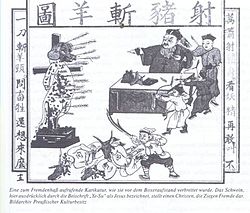Kuomintang anti-Westernism
Some members of the Kuomintang party held anti-Western sentiments. Kuomintang Muslim General Bai Chongxi led a wave of anti foreignism in Guangxi, attacking American, European, and other foreigners and missionaries, and generally making the province unsafe for foreigners. Westerners fled from the province, and some Chinese Christians were also attacked as imperialist agents. Westerners were attacked in the streets, with many of them fleeing to their respective consulates. [11] The three goals of his movement were anti-foreignism, anti-imperialism, and anti-religion. [12]
As a Kuomintang member, Bai and the other Guangxi clique members allowed the Communists to continue attacking foreigners and smash idols, since they shared the goal of expelling the foreign powers from China, but they stopped Communists from initiating social change. [13]
General Bai also wanted to aggressively expel foreign powers from other areas of China. Bai gave a public speech in which he claimed that the ethnic minorities of China were suffering under "foreign oppression". Bai called upon the Chinese government and the people of China to assist them in expelling the foreigners from those lands. He personally wanted to lead an expedition to seize back Xinjiang to bring it under Chinese control, in the style that Zuo Zongtang led during the Dungan revolt. It is important to note that Bai Chongxi was a Hui himself. [14]
The Blue Shirts Society, a fascist paramilitary organization within the Kuomintang modeled after Mussolini's blackshirts, was anti foreign and anti communist, and stated that its agenda was to expel foreign (Japanese and Western) Imperialists from China, crush communism, and eliminate feudalism. [15] In addition to being anti Communist, some Kuomintang members, like Chiang Kaishek's right-hand man Dai Li were anti-American, and they wanted to expel American influence. [16]
History
The causes of anti-Western sentiment in China include the collective memory of the period of Chinese history beginning with the two Opium Wars between 1839–1860 and ending with the expulsion of the Japanese after the Second World War which is known to the Chinese as the century of humiliation [17] [18] when China was sacked by a western coalition. Wang Zheng wrote that it was "attacked, bullied, and torn asunder by imperialists". [19] Kenneth Lieberthal, a political science professor at the University of Michigan, has argued that the demonstrations in Western cities during the Olympic torch relay had "deep historical resonance" amongst Chinese, who suspect that after China's recovery from its fall in international stature from 150 years ago, "the West is trying to humiliate them again". [7] Supporting this view, a 2007 survey found that 45% of the Chinese general public believed that the U.S. was "trying to prevent China from becoming a great power" compared to 32% who believed that the U.S. accepted "China's status as a rising power", 23% were "not sure". [6] Although this sentiment has been partially assuaged by the return to China of Hong Kong and of Macau, the unresolved political status of Taiwan remains for some a reminder of China's weakness and division. [19]
James Kelly, former US assistant secretary for East Asian and Pacific Affairs, has noted that nationalistic sentiments and anger over the torch protests was more concentrated amongst Chinese under the age of 30. [1] Suisheng Zhao [8] and Kenneth B. Pyle [20] argue that a shift in Chinese education policy that these young adults experienced is partly responsible for their increased nationalism. Zheng Wang argues that by the 1990s the international situation had reduced the appeal of Communism as a legitimizing ideology for China's rulers. As a result, the leadership reversed many of the Chinese Communist Party's changes to Chinese historiography from 1949 that interpreted Chinese history as a history of class struggle. Announced in 1991 and fully functioning by 1994, this "Patriotic Education Campaign" reinterpreted history in national terms, rehabilitating figures like General Tso who suppressed a peasant rebellion but stemmed a Russian invasion of Xinjiang, and acknowledging the role of Chinese nationalist (rather than just communist) fighters in the Second Sino-Japanese War. Students find personal resonance more in such narratives than in previous classes about Marxist doctrine because they hear about the atrocities against China not just from history textbooks but from their parents and grandparents. [19]

